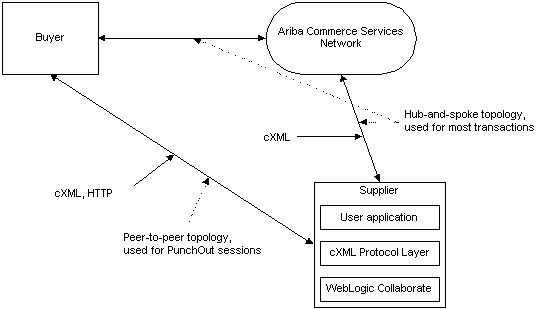


|

|
|
|
|
Introduction
This section introduces the cXML standard for electronic business transactions. cXML is an extensible e-commerce-oriented XML standard developed by Ariba and widely used for e-commerce purchasing transactions.
WebLogic Collaborate Architecture and cXML
cXML support provided by BEA WebLogic Collaborate consists of the following components:
cXML integration is provided through the use of WebLogic Process Integrator business operations and the cXML API. For more information, see Using the cXML API, and Using Workflows with cXML.
The following diagram illustrates the cXML architecture used by WebLogic Collaborate, and shows how WebLogic Collaborate interacts with other systems using cXML.
Figure 1-1 WebLogic Collaborate cXML Architecture
BEA WebLogic Collaborate support for cXML is designed to allow seamless integration of cXML with the standard WebLogic Collaborate infrastructure. For more information about the remainder of the WebLogic Collaborate architecture, see Introducing BEA WebLogic Collaborate. Because of the design environment for cXML, support for hubs other than the Ariba Commerce Services Network is not provided. cXML Protocol Layer The cXML protocol layer provides the ability to send and receive messages by way of the Internet, according to the cXML specifications for transport, message packaging, and security. WebLogic Collaborate creates individual cXML sessions, each of which creates and manages a URL where the WebLogic Collaborate server can receive cXML messages. You can configure cXML sessions as needed using either the WebLogic Collaborate Administration Console or a configuration file. To use a WebLogic Collaborate configuration file, create a configuration file based on the WLC.dtd file to configure cXML sessions as needed. If you use this approach, use the Bulk Loader to load the configuration file into the repository. 
cXML API
WebLogic Collaborate includes comprehensive API support for the creation of cXML user applications. For more information on the cXML API, see Using the cXML API, and the BEA WebLogic Collaborate Javadoc.
Business Documents
Business document processing is performed in BEA WebLogic Collaborate using a combination of public and private processes. Public processes are those processes used to integrate and manage transactions between trading partners. Private processes are those processes used internally by a trading partner; for example to communicate between a company's public processes and its internal ERP and CRM systems. Private processes are thus not directly exposed for trading partner consumption or use. For further explanation, see the BEA WebLogic Collaborate Glossary.
cXML business documents are part of the public processes in which trading partners participate while performing e-business transactions. For example, a PunchOut is part of the process that a Customer trading partner performs with a Product Supplier trading partner to get information from a live repository on the price and availability of goods that the Customer wants to buy and the Product Supplier wants to sell. Trading partners planning to use PunchOuts must do the following:
WebLogic Collaborate implements all business documents available within cXML:
For further information on cXML business documents, go to the cXML.org Web site at the following URL:
http://www.cxml.org
Digital Signatures and Shared Secrets
The standard method of securing transactions in cXML is the shared secret. In cXML terms, a shared secret is typically a username/password combination, exchanged through secure transport before business communication begins.
WebLogic Collaborate includes full support for cXML shared secrets. For more information about implementing and configuring shared secrets, see the BEA WebLogic Collaborate Administration Console Online Help. In addition, you may optionally use https transport for your messages.
In cXML v1.2, optional digital signatures based on the Base64-encoded X.509 V3 certificate model were introduced. These digital signatures are not the same as the RSA CertJ digital signatures implemented within WebLogic Collaborate. At this time, BEA WebLogic Collaborate does not support cXML digital signatures. For more information on this subject, see the cXML.org Web site at the following URL:
http://www.cxml.org
Message Validation
The cXML standard requires all cXML documents to be valid and to refer to published cXML Document Type Definitions (DTDs). Validation is not required by the cXML standard, but it is provided by WebLogic Collaborate as a service.
Limitations
Several cXML-related features are not supported in this release of BEA WebLogic Collaborate:

|

|

|
|
|
|
Copyright © 2001 BEA Systems, Inc. All rights reserved.
|